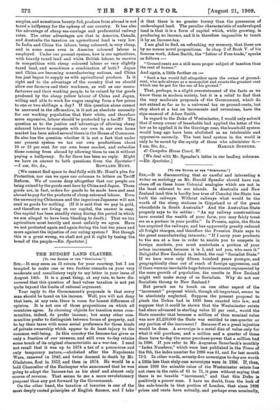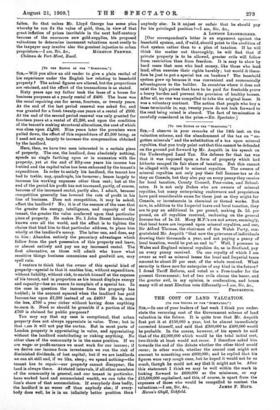[To THE EDITOR OF THE "SeicrArort."] SIR,—It is disconcerting that
so careful and interesting a writer on sociology as Mr. Harold Spender should have run clean off on these loose Colonial analogies which are not in the least relevant to our islands. In Australia and New Zealand (and this is hardly less true of Canada) the State has built the railways. Without railways what would be the worth of the sheep stations in Gippsland or of the great wheatfields in South Australia ? And the Australian State properly says to its settler : "As my railway constructions have created the wealth of your farm, you may fairly treat me as a partner in your profits." In Prussia, again, the State has acquired the railways, and has apparently greatly reduced all freight charges, and therefore the Prussian State says to the great manufacturing interests : "If I carry your products to the sea at a loss in order to enable you to compete in foreign markets, you must contribute a portion of your urban increment, because it is I, and not you, who earn it." Delightful New Zealand is, indeed, the real "Socialist State." If we here were only fifteen hundred years younger, and geographically clear out of reach of foreign aggression, and if there were an inevitable huge future increment represented by the mere growth of population, the results in New Zealand might well make many of us Socialists. Why do not our Socialists throng to New Zealand ?
But permit me to touch on one other aspect of the "increment" proposal which, though all-important, seems to be absolutely neglected. Suppose the present proposal to pinch the Dukes had in 1896 been enacted into law, and suppose that it could be shown that the Westminster estate had since advanced in sterling value 25 per cent., would the State consider that because a million of then nominal value was now £1,250,000 the State was entitled to one-quarter or any portion of the increment ? Because if so a great injustice would be done. A sovereign is a metal disc of value only for what it will purchase, and a million and a quarter of these discs have to-day the same purchase-power that a million had in 1896. If you refer to Mr. Augustus Sauerbeck's monthly "Index Numbers," which were last published in the Times of the 9th, the index number for 1896 was 61, and for last month 752. In other words, seventy-five sovereigns to-day are worth a little less than sixty-one sovereips were in 1896. If, then, since 1896 the saleable value of the Westminster estate has not risen in the ratio of 61 to 75, it goes without saying that there is no taxable "increment," and that this Dille is positively a poorer man. I have no doubt, from the look of the sale-boards in that portion of London, that since 1896 prices and rents have actually, and perhaps even nominally, fallen. So that unless Mr. Lloyd George has some plan whereby he can fix the value of gold, then, in view of that great inflation of prices inevitable in the next lalf-century because of the enormous new gold-supplies, his proposed valuations to determine increment valuations most costly to the taxpayer may involve also the greatest injustice to urban proprietors.-1 am, Sir, &c., MORETON PREWEN. Cheiteau de Vert-Mont, Buell.







































 Previous page
Previous page